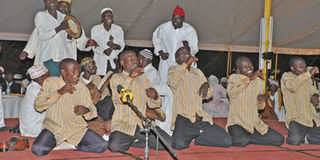Prime
Dancing to the sounds of mataali

Butambala Mataali Group performing on Idd Day. Groups such as these are often invited to grace functions in the Islamic community. Photo by Geoffrey Sseruyange.
What you need to know:
This distinct music most identified by the sound of the drums is synonymous with Islamic functions. While mataali is a song in Luganda, its Arabic and religious roots are still a big part of it as our writer found out.
“Wow, this is fascinating. What is this music called? I really would love to learn it, especially the way they dance.” This is what a colleague told me the first time they saw a mataali performance.
Anyone who has been to an Islamic function where there is mataali, may remember seeing men beating large frame drums and singing songs in which Prophet Muhammad’s (P.B.U.H) name and that of Allah (God) are mentioned most. The group usually has a dance crew comprising of boys who are predominantly in their teens. These pull off the kind of strokes that you will not see in any discotheque in town or at any music concert. Their moves are unique. Thrilled members of the audience respond to the music by lazily nodding their heads. Those who get off their chairs to shake their bodies, dance by slightly bending, then slowly throwing both hands to the right, center and left (the order of the direction does not matter).
Tune of praise and worship
Sulaiman Lwanga, the leader of Butambala Mataali group, says that mataali is the luganda name for the large frame drums which they play. “The songs we sing to accompany the drums are called Kaswiida, an Arabic word for songs that praise the Prophet (P.B.U.H) and God. However, people seem more comfortable with the name mataali. That is why both the songs and drums are called mataali,” he explains.
Lwanga says the history of mataali dates back to the Prophet’s (P.B.U.H) era. He narrates that when the Prophet arrived in Medinah, he was welcomed by women and young girls who expressed their joy by singing him songs and playing mataali. “Mataali came to Uganda in the 70’s. It was introduced by Swahili speaking folk from Zanzibar. The songs they sung were in Swahili and Arabic. They mostly performed the mataali during the celebration of the Prophet’s birthday,” says Lwanga.
A blend of Ugandan culture
Ahmad Mukasa, who has been playing mataali for the last 28 years, says in the late 80’s, he conceived an idea of making mataali more appealing to the people. “I noticed that much as the songs were sung in foreign languages, people were enjoying them. So, I imagined that if I was to translate those songs to Luganda and also compose my own in Luganda, people would love them more. I embarked on that idea and it has since yielded handsomely. I have composed songs on a number of Islamic principles such as prayer, pilgrimage, fasting, marriage and parenting, among others,” states Mukasa adding that; “it is important for one who is singing mataali to have knowledge about the teachings of the religion because that becomes easier to come up with lyrics.
The leader of Butambala Mataali group, whose prowess at mataali is renowned for having put a smile on the late Libyan president, Muammar Gaddafi’s face, despite the latter not understanding Luganda, says his lyrics are spontaneous. “I sing about my observation at the ceremony where I am performing.”
If it is a wedding and I am awed by the smartness of the bride and groom or the beauty of the decoration, I’ll sing about that. When you compose the lyrics before the function at which you are going to sing, you do not move the audience very much,” says Lwanga. Both mataali specialists acknowledge that there are a number mataali groups in the country but they are not sure of the exact number. What stands out among these groups is that most of them sing in Luganda. Lwanga says he is not sure of the reason but assumes that because Luganda is the language that cuts across a sizeable part of the country.
“Just like I cannot explain why a taxi conductor in Fortportal where the Batooro are more than other tribes, calls passengers in Luganda. But, there are mataali groups which sing in other languages like Runyankole and Rutooro,” says Lwanga. Today, mataali is played at occasions like, introduction ceremonies, wedding receptions, graduation parties and welcoming muslim pilgrims from Mecca, et al. Mukasa says aside from singing he also trains his teenage dancers the choreography.
Debate
Music is a contentious subject in Islam. And, mataali has been a victim of the difference in opinions by the muslim scholars. Mukasa says those who oppose the playing of mataali argue that during the Prophet’s (P.B.U.H) era it is women and girls who used to play it yet today, it is men doing so.
This, the scholars say, is going against the practices of Prophet (P.B.U.H) which Muslims are expected to observe. On the other hand, Mukasa states that those who are pro mataali perceive it as a medium of spreading the message of Islam. “You know Islam is taught by three categories of people.
The first is the cleric who preaches about it on the pulpit. The second one is the actor/actress who packages the information they would wish to deliver, in form of a play.
The third person is I who plays mataali. If the song that I am singing is about, say, the importance of prayer, one will firstly; enjoy the music then, secondly; listen to the message I am conveying in the music.
Bearing in mind that mataali helps to spread the message of Islam, I think there is nothing wrong with playing it,” concludes Mukasa.




